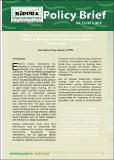Policy Brief No. 12 of 2017-2018 on Building Household Coping Mechanisms with the Effects of Droughts and Floods Using Financial Instruments
| dc.date.accessioned | 2021-02-12T08:37:06Z | |
| dc.date.available | 2021-02-12T08:37:06Z | |
| dc.date.issued | 2017 | |
| dc.identifier.uri | http://repository.kippra.or.ke/handle/123456789/2625 | |
| dc.description.abstract | Effective coping mechanisms are essential to cushioning households’ livelihoods from shocks of droughts and floods. Coping mechanisms entail short term interventions used by households that form foundations for long-term adaptation mechanisms. Households coping mechanisms can be deployed before droughts or floods occur, where households for instance diversify economic activities to smoothen income. Alternatively, households smoothen consumption after droughts or floods have occurred by drawing down personal savings, borrowings, selling of assets, adjustments to labour supply, and utilization of formal and informal insurance arrangements. Use of financial instruments including savings, credit and insurance provide market-based coping mechanisms and they tend to be more effective compared to informal coping mechanisms... | en |
| dc.language.iso | en | en |
| dc.publisher | The Kenya Institute for Public Policy Research and Analysis | en |
| dc.relation.ispartofseries | PB/12/2017-2018; | |
| dc.subject | Droughts and floods | en |
| dc.subject | Coping mechanisms | en |
| dc.subject | Financial instruments | en |
| dc.subject | Households | en |
| dc.title | Policy Brief No. 12 of 2017-2018 on Building Household Coping Mechanisms with the Effects of Droughts and Floods Using Financial Instruments | en |
| dc.type | KIPPRA Publications | en |
| ppr.contributor.author | Shibia, Adan | en |
Files in this item
This item appears in the following Collection(s)
-
Policy Briefs [165]

